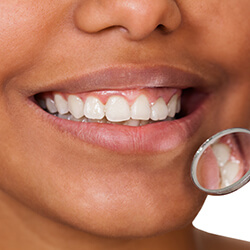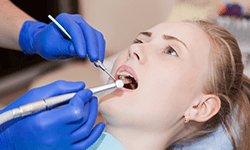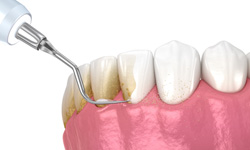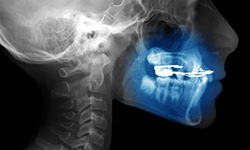Our Non-Surgical Periodontal Therapy Options in Frisco, TX
Non-Surgical Treatment
 Often referred to as initial phase therapy, non-surgical therapy is usually the starting point of comprehensive periodontal treatment. It essentially allows us to halt the progression of bone and gum disease.
Often referred to as initial phase therapy, non-surgical therapy is usually the starting point of comprehensive periodontal treatment. It essentially allows us to halt the progression of bone and gum disease.
Years of dental neglect may take some time for teeth, gums and bone to heal. Therefore, based on years of peer reviewed literature, it’s agreed that initiating a thorough, staged approach is the best solution for correcting diseases of the gums and bones, particularly for patients with early or progressing periodontal disease.
In essence, non-surgical treatment exhausts all efforts before cutting away gums and bones. This initial phase, including gum healing and home care observation, may take up to 6 weeks before a surgical treatment plan can be established for some patients.
Comprehensive Periodontal Examination

During the initial exam, Dr. Zachary Carnow reviews all pertinent medical conditions and the most up-to-date medical history of the patient. This exam may also include digital x-rays, 3D scans, oral cancer screenings, periodontal/gum measurements (i.e. bleeding areas), home care instructions and finally treatment planning.
Prophylaxis

A smile is often the first trait people notice about you, so it’s not surprising that everyone wants a healthy, white smile. Whether your smile is used to exert confidence in public or enjoy time with friends and family, it makes a big difference in your daily life. Unfortunately, the mouth may be the easiest body region to neglect. Forgetfulness and laziness with proper home care can easily lead to bleeding and swollen gums.
Fortunately, routine cleanings every 6 months help maintain a healthy mouth for most patients. By removing hardened food and plaque deposits, we can reverse the signs of gingivitis, a common condition characterized by inflammation of the gum tissue that does not affect the bone.
Prophylaxis, or routine cleanings, are performed every 3, 4 or 6 months on patients exhibiting a healthy mouth with minimal bone and gum loss (also described as attachment loss). Some patients who show signs of inability to properly clean (due to physical or mental barriers) or accrue more hardened plaque are recommended to be seen at a more frequent interval to prevent the onset of periodontitis. Having one’s teeth cleaned routinely is the easiest preventive measure taken to ensure a healthy and long-lasting smile.
Scaling & Root Planing

Scaling and root planing essentially amounts to a deep cleaning of the mouth, during which we strive to remove disease-causing bacteria from the teeth so the gums have a chance to heal. It can be an effective treatment for individuals with moderate periodontitis who do not yet require surgical intervention.
Do I Need Scaling & Root Planing?

Our team can evaluate your case and let you know if scaling and root planing is right for you. In some instances, thorough oral hygiene is enough to reverse gum disease. In more advanced cases, scaling and root planing or another treatment may be necessary.
Here are some signs that you should visit us for a consultation:
- Your gums are red and swollen.
- Your gums are starting to recede, or you notice pockets between your teeth and gums.
- Your gums bleed easily when you brush and floss.
- You have chronic bad breath.
The Process of Scaling & Root Planing

Scaling refers to the process of removing all plaque and tartar (calculus) from above and below the gumline. This procedure is typically performed with a hand scaler and ultra-sonic cleaner to separate calculus from teeth. After all plaque has been removed from the bottom of the gum pockets, we move on to root planing. Root planing involves smoothing out the tooth roots to help the gums reattach and prevent future plaque buildup. Depending on the extent of your gum disease, scaling and root planing may require one or more appointments.
Aftercare Tips for Scaling & Root Planing

It can take a few weeks to fully recover from scaling and root planing. Here are some tips that may help you enjoy a smooth healing process:
- Regularly rinse your mouth with warm salt water.
- Eat soft, mild foods that will not irritate your sensitive oral tissues.
- Be very gentle when carrying out oral hygiene tasks.
- Get enough rest during the first few days after your procedure.
- Call us if you have questions or concerns during your recovery.
Bruxism

This is an unnatural habit that involves grinding, clenching or clamping the teeth. Over time, these forces can easily damage the teeth and their supporting structures. Common signs of bruxism include:
- Wearing patterns along the chewing surfaces of teeth
- Flattening chewing surfaces (indicative of side to side grinding)
- Pointed chewing surfaces (indicative of clenching, like chewing on imaginary bubble gum)
Furthermore, bruxism may be a commonly overlooked sign of a greater problem such as undiagnosed anxiety or a sleeping disorder. If you experience bruxism symptoms, including earaches, headaches, eating disorders, anxiety or chronic stress, you’ll want to be examined further to receive the most accurate diagnosis.
Bite Adjustment

Many people don’t realize that their misaligned bite has the potential to cause gum recession. When crooked teeth come together, they can apply too much force on the gums and bone, resulting in receding gums and the development of pockets. Remember, your teeth are not static entities; they are constantly moving and shifting throughout their life. For example, teeth may move when:
- Retainers are not worn
- Teeth are removed and space is left empty
- Teeth are not in the right place or malpositioned
To fix shifting or misaligned teeth, we can fill the spaces in your smile with dental bridges, dentures or dental implants. If your teeth are simply crooked, orthodontic therapy can shift them into a healthier position over time. After this treatment, it is crucial to wear your retainer to prevent your teeth from relapsing.
To learn which non-surgical periodontal therapy is right for you, contact your periodontist in Frisco,
Dr. Zachary Carnow, today!
